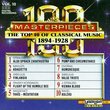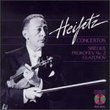| All Artists: Sergey Prokofiev, Igor Stravinsky, Dimitri Mitropoulos, Zubin Mehta, New York Philharmonic Title: Stravinsky: Le Sacre du Printemps; Prokofiev: Romeo & Juliet [Excerpts] Members Wishing: 0 Total Copies: 0 Label: Sony Original Release Date: 1/1/1992 Re-Release Date: 6/2/1992 Genre: Classical Styles: Ballets & Dances, Ballets, Historical Periods, Modern, 20th, & 21st Century Number of Discs: 1 SwapaCD Credits: 1 UPC: 074644816921 |
Search - Sergey Prokofiev, Igor Stravinsky, Dimitri Mitropoulos :: Stravinsky: Le Sacre du Printemps; Prokofiev: Romeo & Juliet [Excerpts]
![Stravinsky: Le Sacre du Printemps; Prokofiev: Romeo & Juliet [Excerpts]](https://nationalbookswap.com/cd//l/73/4573/6004573.jpg) | Sergey Prokofiev, Igor Stravinsky, Dimitri Mitropoulos Stravinsky: Le Sacre du Printemps; Prokofiev: Romeo & Juliet [Excerpts] Genre: Classical
|
Larger Image |
CD DetailsSimilarly Requested CDs
|
CD ReviewsPleased, Dimitri! Joanna Daneman | Middletown, DE USA | 01/14/2003 (5 out of 5 stars) "I love Dimitri Mitropoulous doing big works (my other favorite Mitropoulos recording was Berlioz' Symphonie Fantastique--can hardly listen to someone else play that work.) For what ever reason, Mitropoulous is exceptionally good with deeply colorful orchestrated works, like the Berlioz and here, the Romeo and Juliet ballet suites of Prokofieff. This work is Prokofieff at his melodic best and even though the recording is from 1957, it shines as a stellar performance. And Mitropoulous was one of the conductors who, I think, got the very best out of the sometimes recalcitrant New York Philharmonic.Ditto Zubin Mehta, who is also superb with early 20th Century works and big stuff like Bruckner. And with famously "difficult" orchestras --he spent 17 years as music director of the Los Angeles Philharmonic and 13 with the New York Philharmonic. Here he gives a fascinating performance of the Stravinsky "Sacre du Printemps" which can sound trite in the wrong hands. Here, Maestro Mehta brings out all the oriental richness and exotic primitivity of this watershed work." Two modern classics realized with tremendous vitality. Michael Newberry | Santa Monica | 02/22/2001 (5 out of 5 stars) "Though this Romeo and Juliet was recorded in 1957 the sound is quite good, and definitely excellent for the time. I love Mitropoulos interpretation; it is haunting, moody, big, modern, and monumental. He pushes the music to its outer reaches yet maintains cohesive line throughout, there is a part where the woodwinds each maintain the line and yet stand out beautifully. The strings sound emotionally gripping and anxious. I have not heard most of the interpretations from other conductors but this one blows me away!Again, with Rite of Spring, I have not heard all the interpretations, and normally I don't like Mehta's symphonic conducting, his operatic conducting is phenomenal (Turandot, Il Trovatore, Tosca), but his Rite is...if it were not for the clarity of the orchestra's color and sound I would call it SAVAGE.The booklet comments on these works' inceptions and their path towards being autonomous classics." Boisterous, heartfelt Prokofiev, plus a sonic spectacular 'L Santa Fe Listener | Santa Fe, NM USA | 01/13/2006 (5 out of 5 stars) "It's not every day that Zubin Mehta outshines Karajan, but he does here. This 1978 Le Sacre is a sonic blockbuster, the microphone stuck down the orchestra's throat. The NY Phil. sounds like the greatest in the world, and Mehta goes for flat-out excitment and intensity in every bar. Karajan misjudged Le Sacre and turned in a fussy, glossy performance. Mehta may veer too far in the other extreme--shouldn't there be a moment of repose, a hint of nuance? On his own terms, though, this is a savage joy, in the style of Muti's equally blatant version on EMI.
You would never think the same orcheestra was playing the eight mixed excerpts from Prokofiev's Romeo and Juliet from 1957. They sound rough-hewn and undisciplined, with buzzy saxophones and a boisterous energy of a village dance on the Volga. Which is all to the good, because this music is too often smoothed out and Westernized, lacking any rough passion. Mitropoulos conducts with much deeper feeling than any conductor I've heard since Mravinsky, who also took a seriously musical approach to Prokofiev's often facile romanticism. One hangs on to every note here--too bad we only get 38 min. worth, but they are a thrill." |

 Track Listings (22) - Disc #1
Track Listings (22) - Disc #1






